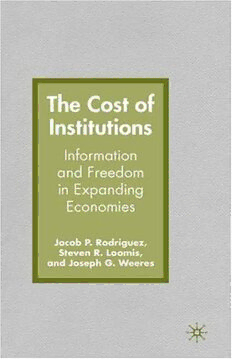
The Cost of Institutions: Information and Freedom in Expanding Economies PDF
209 Pages·2007·0.612 MB·English
Most books are stored in the elastic cloud where traffic is expensive. For this reason, we have a limit on daily download.
Preview The Cost of Institutions: Information and Freedom in Expanding Economies
Description:
How do institutions shape the long-term direction of economies? What are the relevant causes of institutional change? How do institutions alter our standards of rationality and the possibilities of individual action? And are institutions raising or lowering the total sum of costs in the social order? Addressing such questions, The Cost of Institutions is a detailed account of how institutions impose information costs on markets--economic, political, and cultural. This book disputes the possibility that a market under scale can achieve equilibrium. It argues that as institutions attempt to support the growth of markets, they evolve with a general tendency to favor a specific form of information. The authors explain how this distortion in the information base of the economy biases the incentive system and the pattern of resource allocation; they further explain how it transforms production probabilities and the intricacies of human exchange, causing the loss of the capacity to preserve individual liberty. Scholars and students from a variety of fields will welcome The Cost of Institutions, which identifies the dominant factors that link the interaction of institutions across markets and, in so doing, takes a major step toward the development of an integrated theory of institutions.
See more
The list of books you might like
Most books are stored in the elastic cloud where traffic is expensive. For this reason, we have a limit on daily download.
